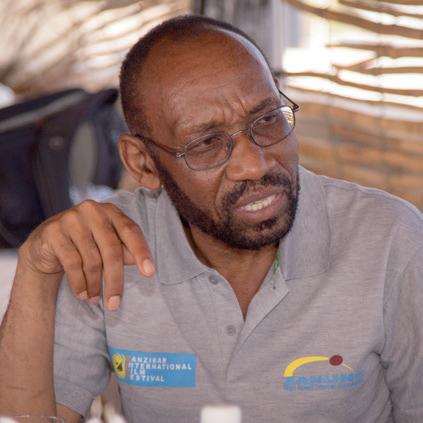
9 minute read
Zanzibar's celebration of cinema returns
Great news for film lovers and Zanzibar’s hospitality industry: after a Covid-enforced break in 2020, the Zanzibar International Film Festival returns in July – albeit in a truncated, socially distanced fashion. Mark Edwards speaks to its director, award-winning filmmaker Martin Mhando, about how the event celebrates the shared experience of cinema.
Time was when there were more than 50 cinemas across Tanzania and a night at the movies was one of the most popular pastimes in the country. Many would fall in love there – either with their date that evening or the wonders on the screen with Hollywood or Bollywood blockbusters transporting them to another world. However, rising ticket prices made cinema trips prohibitively expensive for all but a few and by the mid-1990s all cinemas had been closed down. Today a handful of exclusive modern multiplexes have sprung up, but they have little to link them to the country’s cinematic heyday.
Away from the mainland, Zanzibar currently has no operating cinemas at all, yet the magic of the movies arrives on the archipelago each year with the Zanzibar International Film Festival (Ziff). The public event gives locals and tourists a cherished opportunity to see films on the big screen at some spectacular pop-up locations while championing the work of emerging filmmakers from Africa and the Dhow Countries along the shores of the Indian Ocean, whose maritime trade routes over the centuries have done so much to create Zanzibar’s unique cultural mix.
Sharing our heritage
Ziff was launched in 1998 – just a couple of years after the last Tanzanian cinema had bitten the dust – and is now East Africa’s biggest film festival, reaching around 50,000 people each year through its screenings, workshops and associated events such as live music concerts and dhow races. The festival’s director, filmmaker and academic Martin Mhando, believes over the years it has played a pivotal role in “keeping alive the embers of the cinema culture” in Tanzania and being “a cosmopolitanising agent of the Zanzibar community”.
“For many years Ziff was the only space in Zanzibar where you would be able to sit with hundreds of people to enjoy a film screening,” he says. “The 1980s saw the closing down of cinemas across the continent and festivals became the home of all lovers of cinema. Film has helped people who would otherwise be estranged from the rest of the world and in that way, Ziff has opened society up to global influences.”

Reggae star Shaggy is among the music acts who have performed at the festival
Such a cultural coming together should be keenly felt at this year’s event. Films submitted in competition for the festival’s 12 awards are given priority if they convey a theme of ‘Sharing Our Heritage’, involving, according to the Ziff website, “the idea of merging concerns in a global village, cultural encounters, engagement and exchange”. The theme seems fitting as the world tentatively attempts to return to its interactions and shared experiences amid the pandemic.
Last year’s festival was called off for the first time in 22 years due to Covid-19 concerns and Mhando and his team had a long, nervy wait for the go-ahead for 2021. The reduced preparation time has meant that this year’s festival will be on a smaller scale with fewer films in competition and events running over five days from July 21 to 25 rather than the usual nine or 10, but Mhando says more than 30 countries will still be represented by the films in competition and plans are in place to give the festival its largest reach yet.
He says: “We intend to spread the screenings to other cities on the Tanzania mainland and in that way screen for longer than five days and reach large audiences or even larger than normal. After the festival we plan to screen films in Dar es Salaam, Mwanza, Arusha and possibly Morogoro and Mbeya. This is to ensure that these important films reach as many people as possible.”
Stone Town comes alive
Those first five days of Ziff, though, will be all about Zanzibar. The historic port city of Stone Town is always a hive of activity, but it reaches new levels of liveliness as the hub of the festival. “During Ziff the atmosphere is tactile,” says Mhando. “Zanzibar and especially Stone Town come to life.”
Packed houses of more than 1,500 people attend the public evening screenings at the dramatic outdoor amphitheatre provided by the Old Fort, which is the oldest building in the Unesco Heritagelisted Stone Town. This year capacity will be reduced to a more socially distanced 500 and there will be two screens showing different films concurrently. There will also be press screenings throughout the day, Q&A sessions with the directors and stars of films in competition and a host of workshops – with award-winning documentary filmmaker Nick Broomfield among those who have shared their skills at past events.
Star-studded event
As well as a huge variety of films to watch the festival also showcases the other diverse elements that make up Swahili culture on the islands, such as its celebrated food and music. These all come together to create memorable nights on the Stone Town harbour during the festival with filmgoers mingling with customers for the street food stalls of Forodhani Gardens and once the film credits roll, the Old Fort’s music venue, the Mambo Club, takes over with live bands to entertain deep into the night.
Past musical acts that have performed at the festival include Grammy award-winning reggae star Shaggy and, of course, Ziff also attracts plenty of big names from the film industry. Mhando mentions US actor and activist Danny Glover, whose film Toussant opened the 2009 festival, then reels off a host of names that include actor and writer Melvin Van Peebles and his film director son, Mario; Canadian actress Tonya Williams, IndianAmerican filmmaker Mira Nair (“a frequent visitor,” says Mhando); US stage and film actor Ntate Mwine; Leleti Khumalo, the South African star of hit musical film Sarafina! and Jon Kani, the actor who played T’Chaka in Marvel Studios’ global hit Black Panther.

ZIFF director Martin Mhando
For all the luminaries it attracts, Ziff prides itself on bringing the magic of cinema to everyone. Film screenings are free to locals and just TSH 5,000 (US$ 2) for non-residents. The festival aims to be an inclusive and inspiring event. Mhando talks about “the aspirational spirit only found in the darkened cinema space” and he hopes the hundreds of local children who swarm into the public films at the Old Fort or attend one of the special screenings at a Zanzibar school during the festival will feel the same wonderment and inspiration he felt at first seeing such immersive stories told on the big screen.
Festival organisers also ensure that marginalised groups and communities in more remote parts of the archipelago get a chance to see films through its Women, Children and Village Panoramas. Their efforts have led to some incredible pop-up cinema creations across the archipelago, including a screen in the water at fishing village Nungwi on Unguja’s northern tip and one set up at the football stadium in Paje on the island’s south east coast.

filmmaker Mira Nair
©Peter Bennett
Pop-up screenings
This year will see screenings at villages in Nungwi, Dunga and Paje on Unguja as well as in Pemba. To Mhando it is vital that as many communities as possible on the islands get to appreciate the shared experience of cinema.
“A festival is about a place, a location,” he says. “It is therefore imperative that we involve as wide a base of the communities of Zanzibar as possible. This is even more important when you realise that this is probably the only time in the year that big audiences would be congregating to watch films. As a film culture event therefore, Ziff is an extremely important undertaking.”
Mhando and Ziff go way back. He’s been its director since 2006, but he also claimed the top award in the festival’s first year, when Maangamizi: The Ancient One, a visually arresting drama that Mhando co-directed, won the Golden Dhow for Best Feature Film. It also went on to become the first African film nominated for an Oscar. No Tanzanian film is yet to match that feat, but Mhando believes in the ensuing years Ziff has been instrumental in supporting a homegrown film industry that has had to adapt in the absence of cinemas. Among recent additions to the festival’s awards is one for Bongo Movies, an emerging genre of low-budget films shot fast on camcorders and released faster on DVD for home viewing or in Dar’s ‘secret cinemas’ – back rooms to bars or clubs with chairs arranged for customers to watch films on a TV screen. Ziff has done much to legitimise the genre and raise the profile of some of its most talented exponents. Bongo filmmakers in competition get to see their films on the big screen and there are opportunities for networking and to hone their skills at the film workshops.
Tanzanian cinema
Mhando says: “We are able to highlight the role of cinema to the nation through screening Bongo movies and conducting a competition where we highlight excellence. Bongo movies filmmakers get an opportunity to measure themselves against the globe as well as imbibe the global influences that come through cinema. In that way Ziff becomes a barometer for the health of the cinema nation.”
Ziff also plays an importantrole in spreading the word on the limited number of Tanzanian filmsreleased in cinemas. This year’sevent will include screenings ofaction-packed Tanzanian film Nyara,which premiered in Kenyan cinemasin February this year and is the firstfull-length feature from renownedvideo and music production studioWanene Entertainment, as well asDar-set drama Binti, directed, writtenand produced by the all-womenteam at Black Unicorn Studios.
Seeing these homegrown filmsprojected on the big screens underthe Zanzibar night sky is testamentto the importance of Ziff in nursingthe returning health of the Tanzanianfilm industry. The pop-up screensmay be as close as the islandershave to a cinema for now, but itgives them a taste of the togethernesswatching films en-masse canbring. The festival fleetingly bringsthe magic of film to audiencesyoung and old to gather together inrapt attention, united by collectivegasps and laughs as the movieunfolds. Make sure you are a part ofthis celebration of cinema in July.
For a full list of competing filmsto be announced closer to thefestival date, visit the Ziff websiteat ziff.or.tz
MY FIVE FAVOURITE FILMS IN ZIFF HISTORY
Chosen by festival director Martin Mhando
1. Selma, directed by Ava DuVernay (2014)
2. The Reluctant Fundamentalist, directed by Mira Nair (2012)
3. Kalushi, directed by Mandla Dube (2016)
4. Ezra, directed by Jay K (2007)
5. Gospel Hill, directed by Giancarlo Esposito (2007)
Saving the Majestic
The chance to stage one of Ziff’s memorable pop-up screenings at the Majestic, a former cinema in Stone Town was very special for festival director Martin Mhando. In its glory days, the 1950s-built, Art Deco-styled Majestic was one of Zanzibar’s most attractive and popular cinemas, but the years of disuse have meant it has lost much of its lustre. It no longer has a roof so the screening took place under the stars with the film projected against an internal wall. Still, the screening meant a lot to Mhando, who has been leading efforts to return the Majestic to its former glory – a campaign that has gained the support of the Zanzibar government and Unesco – and hopes ultimately that it will be the host venue for Ziff. “The Majestic is the Cinema Paradiso of Zanzibar,” Mhando says.

The festival’s annual dhow race
©Peter Bennett









